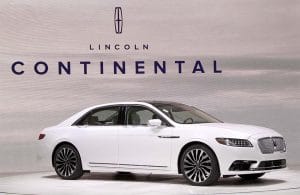Once the most popular model in the Lincoln line-up, the MKZ sedan is set to breathe its last, a victim of both declining sales and the need to change over production at parent Ford Motor Co.’s Hermosillo, Mexico assembly plant.
It also hasn’t helped that Lincoln is all but abandoning sedans, like the Ford brand, in response to the most dramatic market shift in decades. Significantly, over the past year it has brought out the new Corsair, Nautilus and Aviator SUVs.
Lincoln also this week confirmed what TheDetroitBureau.com had previously reported, that it will be producing an all-new, all-electric SUV in a partnership with Rivian. Ford invested $500 million in the Detroit-based EV start-up last April and the battery-powered SUV will be the first visible result of that new partnership.
Mention of the MKZ’s demise was almost a throwaway line in a news release about the Lincoln-Rivian project, stating that, “As Lincoln adds a new luxury electric vehicle to its lineup, production of the MKZ sedan will end this year in order for the Hermosillo Assembly Plant in Mexico to prepare for production of new Ford vehicles.”
(Lincoln getting help from Rivian to develop all-electric SUV.)

The Mexican plant building the MKZ apparently will be changed over to handle all-electric products like the SUV Lincoln is developing with Rivian.
While there was a bit of a gap between stating that the MKZ will go away and that there needs to be space cleared up at Hermosillo, it is clear that the Mexican plant will serve as one of the main Ford manufacturing sites for future electric vehicles.
Of course, the skateboard-like platform Rivian has developed very well could find application in other Ford and Lincoln battery-cars, including everything from SUVs to pickups and sedans, there seems to be less of a likelihood Lincoln would also rush to add a new four-door to its line-up in today’s market. Currently, utility vehicles account for nearly two-thirds of U.S. new vehicle sales.
That said, Lincoln is struggling to build a base for itself in China, the world’s largest luxury car market, and sedans remain a viable market segment there. Meanwhile, plug-based vehicles are also a large part of the market thanks to China’s increasingly stringent New Energy Vehicle, or NEV, mandate.
For now, though, the fate of the MKZ seems completely sealed and while there is a 2020 model, there will be nothing following.
Ironically, the MKZ was the first Lincoln to be electrified. In a break with the rest of the industry, in fact, the luxury marque offered a conventional hybrid version of the sedan at the same price as the gas-powered model.
(Lincoln Corsair Grand Touring set to become luxury brand’s second plug-in hybrid.)
That may explain why demand for the MKZ hit a peak of 34,009 in 2014. But volume plunged to just 19,852 last year.
On the mainstream side, Ford has already ordered the phase-out of all U.S. passenger car models but for the Mustang. (And, notably, its first move to extend the brand comes in the form of the all-electric Mustang Mach-E SUV.)
On the Lincoln side, the mid-range MKS was already pulled from showrooms in 2018. With the demise of the MKZ, the brand will be left with just one passenger car model. And the Continental has been little more than an asterisk on the sales charts, U.S. customers purchasing just 6,586 of them in 2019, down from 8,758 the year before.
While flagship models often generate more of a halo than actual demand, the Continental hasn’t done that well there, either, and there’s a lot of buzz at Ford headquarters in Dearborn, Michigan, that it, too, may be ready to drive off into the sunset, leaving Lincoln a completely SUV-oriented brand going forward.
(First Drive: 2020 Lincoln Nautilus Black Label Edition.)


